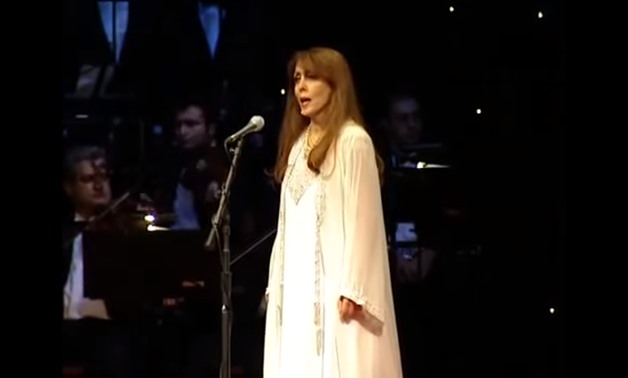
Fayrouz on Stage - Photo Courtesy - Wikipedia
CAIRO - 19 October 2018: Lebanese singer and composer Ziyad Rahbani revealed that he has completed recording his new song that he dedicates to his mother, veteran singer Fairuz.
"The new song is finished and will be out in the market soon. The song is called 'Khalas' (No more)," exposed Rahbani during an interview with Lebanese news anchor and political talk show host, Dima Sadek.
This song is considered the first musical duet by the mother and son, after years of dispute, because of statements previously declared by Rahbani, where he claimed that his mother, veteran singer Fairuz, admires Hassan Nasrallah, secretary general of Hezbollah, the Shite sector in Lebanon.
 Veteran Lebanese singer Fairuz - ar.wikipedia.org
Veteran Lebanese singer Fairuz - ar.wikipedia.org
The statements angered Fairuz and Rahbani’s sister; Lebanese director Dima at the time.
Born in 1956, Rahbani is a Lebanese composer, playwright, pianist and political activist/commentator. His musical compositions are widely spread throughout the Arab World. Several musical works done by Rahbani satirize Lebanese politics during and after the civil war, where he openly criticized the traditional political establishment in Lebanon.
Rahbani’s new song:
ما في حديث .. والجو تعيس .. ضيعانو كيف .. خلص الحب بأي حديث .. ما في حديث .. لشو الحديث ؟ خلص الحب ما في مجال .. لاي سؤال .. الا بحال بعد في حب .. لكن خلص خلص .. خلص .. يعني خلص خلص خلص .. خلص ..
Born in 1935, Nehad Wadie' Haddad, known as Fayrouz, was born to a middle class family in Lebanon.
She started her career at the age of six after joining the Lebanese Radio choir in 1940. Shortly after, Halim El Roumi, director of Lebanese Radio, composed her first song.
Fayrouz is a living legend, one of the last singers from her era still alive and performing.
She is a witness to the golden age of Arabic music, alongside other legends; Umm Kalthom and Mohamed Abdel Wahab. She formed a new wave of Arabic music, combing oriental folk tunes with international music trends like jazz and blues.
In 1950, Fayrouz’s started an ambitious music project with the Rahbani Brothers, developing traditional Lebanese music. Together they made influential contributions to the history of oriental music.
Her songs tackled various universal and national themes such as the Palestinian political plight, adolescence, Christmas hymns, pastoral Lebanese, love and family.
Cooperation between Fayrouz and the Rahbani Brothers grew to include musical sketches, films and plays such as “Mais El Reem” (The Deer's Meadow), “Loulou,” “Biyaa’el Khawatem” (Ring for Sale), and “Hala Wi El Malek” (Hala and the King).
These works ignited Arabic musical theater and brought Lebanese folk heritage back to life.
Her career in theater and cinema included 15 plays and three films.
Including “Baya el-Khawatim,” which was directed by the legendary Egyptian director Youssef Chahine.
Fayrouz has released more than 800 songs, performed all over the world and received honors from a number of countries including Egypt, Syria, France, the USA and Jordan.
Some of her most popular songs include “Kifak Enta” (How Are You), “Ana Li Habibi” (I Am for My lover), “Shat Iskandaria” (Alexandria’s Beach), “Zahrat El Madaeen” (The Most Beautiful City), “Al Quds” (The Holy One), “Saaltak Habibi” (I Asked You, My Love), “Adish Kan Fi Nas” (Many People Here), “Haboo Baadon” (They Loved Each Other), just to name a few.

Comments
Leave a Comment